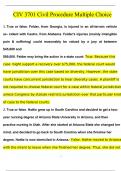CIV 3701 Civil Procedure Multiple Choice
1. True or false. Felder, from Georgia, is injured in an all-terrain vehicle
ac- cident with Castro, from Alabama. Felder's injuries (mainly intangible
pain & suffering) could reasonably be valued by a jury at between
$45,000 and
$90,000. Felder may bring the action in a state court: True. Because this
case might support a recovery over $75,000, the federal court would
have jurisdiction over this case based on diversity. However, the state
courts have concurrent jurisdiction to hear diversity cases. A plaintiff is
not required to choose federal court for a case within federal jurisdiction
unless Congress by statute restricts jurisdiction over that particular kind
of case to the federal courts.
2. True or false. Hattie grew up in South Carolina and decided to get a two-
year nursing degree at Arizona State University in Arizona, and then
practice nursing in Utah. After she started at Arizona State she changed her
mind, and decided to go back to South Carolina when she finishes her
degree. Hattie is now domiciled in Arizona.: False. Hattie moved to Arizona
with the intent to leave when she finished her degree. Thus, she did not
1/
101
,acquire domicile in Arizona; she retained her South Carolina domicile.
She still does, until she moves to another state with the intent to remain
indefinitely.
3. Slovinsky, from Poland, comes to the United States to teach for a year at
the University of Colorado. He rents an apartment in Denver on a one-year
lease. Slovinsky is on a tourist visa; he has not been admitted to the United
States for permanent residence, but he would like to stay in Denver if the
University offers him a permanent position and he gets permanent
residence immigration status at some point. While in Colorado he gets into a
contract dispute with Wilmer, from Nebraska, and Stein, from Colorado. If
Slovinsky sues Wilmer and Stein in federal court, credibly seeking $150,000
in damages, that court
A. will have diversity jurisdiction, because Slovinsky remains a citizen
of Poland.
B. will not have diversity jurisdiction, because Slovinsky is a citizen of
Col- orado.
C. will have diversity jurisdiction, even if Slovinsky is a citizen of
2/
101
,Colorado, because one of the defendants, Wilmer, is from another state.
D. will not have diversity jurisdiction, because Slovinsky' principal place of
business is in Colorado.: A. Slovinsky is still a citizen of Poland, even if
he is domiciled in Colorado under the domicile test. Because he has not
been admitted to
3/
101
, the United States for permanent residence, the bar on a foreign citizen
suing a citizen of the state in which he is domiciled (see s. 1332(a)(2))
does not apply. So we have Slovinsky, from Poland, suing Wilmer from
Nebraska and Stein from Colorado. In the language of s. 1332(a)(2) this
is a case "between citizens of a State and citizens or subjects of a
foreign state." Since the amount-in-controversy requirement is met this
case is good to go.
4. Gonzalez, from Virginia, hires Watson, from Maryland, to build a house for
her, for $140,000, and hires Holmes, also from Maryland, to do the electrical
work on the house, for $20,000. Gonzalez pays the contractors, but when
she takes possession she realizes that the work is so shoddy that the house
is worthless. She wishes to sue Watson and Holmes in federal court for the
amount paid to each. Gonzalez's case against the two contractors
A. would be within the constitutional scope of the diversity jurisdiction,
and consequently does not have to be authorized by statute.
B. would be within the constitutional scope of the diversity jurisdiction
and authorized by s. 1332.
4/
101





